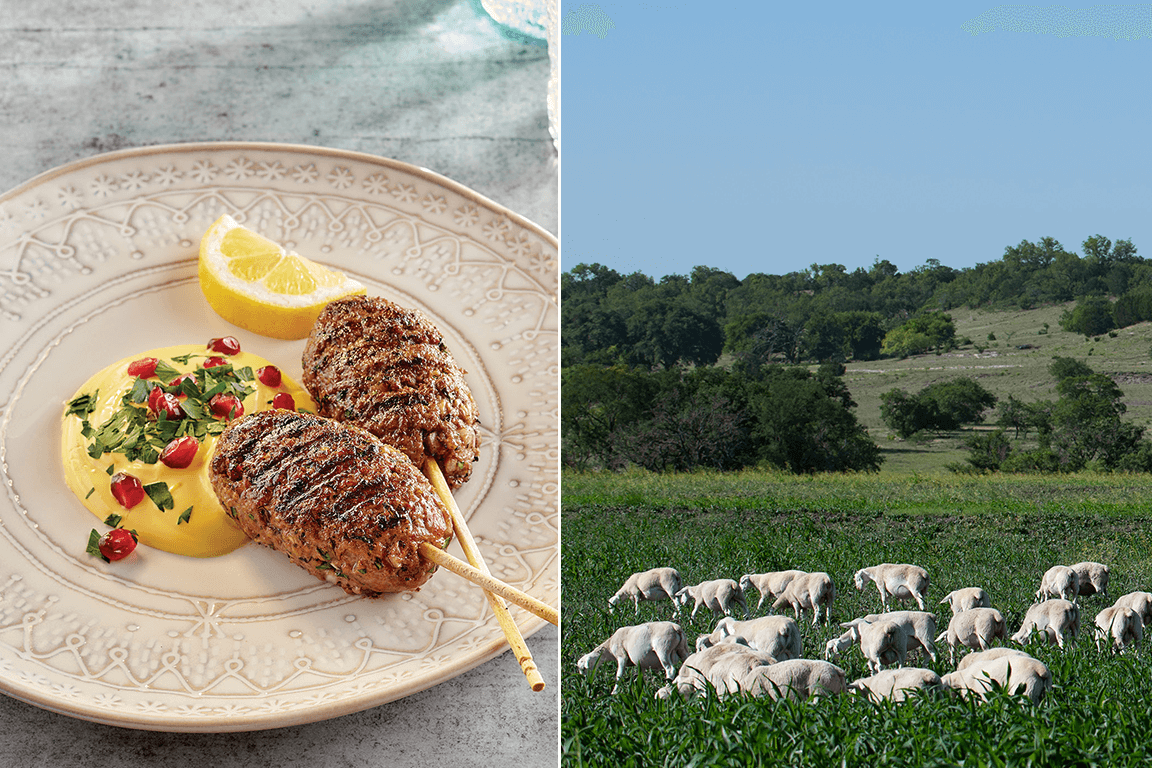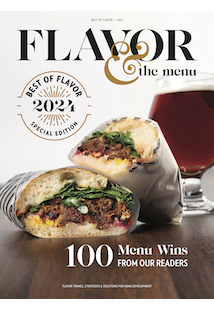
The American lamb story is based on a rich heritage of animal stewardship and a deep commitment to sustainability. And as consumers become more interested in sustainability initiatives, it’s important operators know and share the backstory of their menu offerings.
On the plate, lamb embodies many of today’s trend-forward menu-development efforts, from the many interpretations of shakshuka to a Smoked Lamb Torta With Birria Dip. But serving American lamb also comes with a unique and important backstory that offers chefs the opportunity to develop a deeper connection with consumers.
“While chefs have always recognized sheep for their lamb and milk, they may not know that sheep are also important for grazing,” says Megan Wortman, executive director of the Denver-based American Lamb Board. “Sheep grazing removes invasive species, increases biodiversity and even helps to prevent forest fires.”
Across the U.S., American lamb farmers and ranchers are engaging in prescribed sheep grazing, using sheep to enhance landscapes, improve habitats, support wildfire prevention, and even help other industries in their efforts to be more sustainable. Having sheep graze on specific areas of land for vegetation management can help control the growth of invasive or unwanted plants and create more favorable conditions for desired vegetation to thrive. The selective grazing habits of sheep can create a mosaic of different plant heights and densities, benefiting various wildlife species.
As master grazers, sheep are stewards of the land and more effective weed mowers than machines—and they reduce fuel, pesticide, and fertilizer use. Sheep offer natural weed control around vineyards, orchards, and solar operations. Many wineries graze sheep through the vineyards to clear weeds and to reduce or eliminate the use of herbicides.
 Photo Credit: American Lamb Board
Photo Credit: American Lamb Board Sheep are the ideal option to maintain grasslands that support solar “farms.” They are small enough to fit underneath the panels, which also provide shade and protection from harsh weather.
Because they are small enough to fit under solar panels, they are being used increasingly for solar “farms”– “an ingenious way of doubling the economic value of land used in renewable energy production,” adds Wortman.
Many consumers are unfamiliar with the benefits of sheep grazing. Chefs are vested in educating customers on sheep grazing as part of a larger conversation around holistic land management, regenerative agriculture, rotational grazing and animal husbandry.
“It helps move the needle toward a deeper connection with how our food is grown, handled, and nurtured,” says Daniel Asher, Chef/Partner of three restaurants in Colorado, including River and Woods, Acreage and Ash’Kara. “Agriculture shouldn’t be a concept that feels far away or twice removed; agriculture should be intimate and close. It’s the foundation of civilizations, our past and our future.”
Asher is passionate about the responsibility chefs have when it comes to sourcing. “Anyone in the culinary world engaged in feeding people should be connected to where their food comes from,” he says. “Being a chef demands care, reverence and meticulous knowledge of cultures, food systems, the environment and the local community. Sheep are a crucial part of this story. Pastured sheep tend the earth, heal the soil and help things grow. Developing relationships with the ranchers that raise them and sharing that story with our guests is a powerful element of restaurant hospitality.”
Pastured sheep tend the earth, heal the soil and help things grow. Developing relationships with the ranchers that raise them and sharing that story with our guests is a powerful element of restaurant hospitality.
—Chef Daniel Asher
The American sheep industry continues to invest in both animal care and environmental stewardship, which includes expanded research and education programs with farmers and grazing partnerships to optimize the use of best management practices to preserve and enhance the land sheep graze upon.
“Menuing American lamb has benefits far beyond the kitchen,” says Wortman. “By choosing domestic lamb, chefs and operators are helping to support family ranches and small farms, as well as the health of local rangelands and pastures on which the sheep graze.”
To find a local lamb supplier near you, email [email protected]








